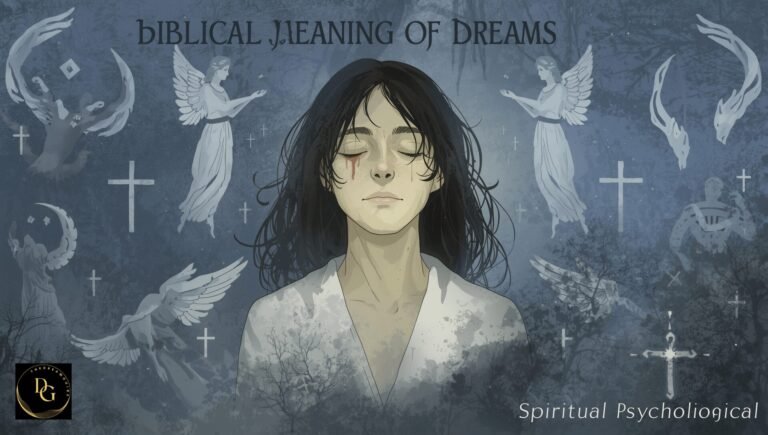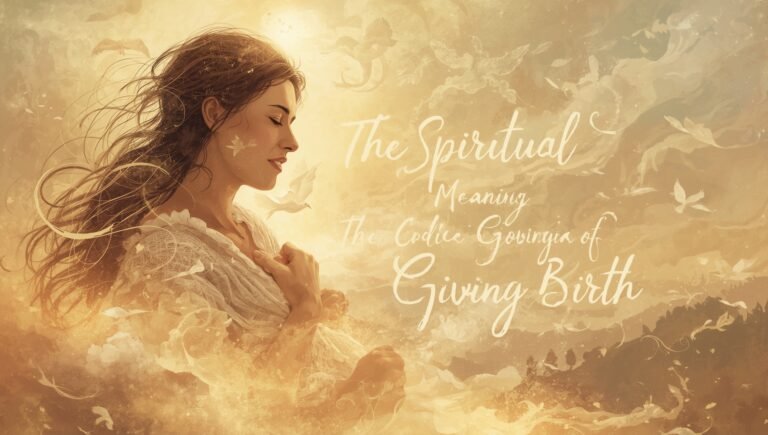Biblical Meaning of Ghost in a Dream – Complete In-Depth Guide
Dreams have always fascinated humanity. Since ancient times, people have believed that dreams are not random images but meaningful symbols that reveal hidden truths. In biblical tradition, dreams were often considered messages from God, guiding people toward decisions, warnings, or spiritual awakening. For example, Joseph in Genesis was given dreams that predicted the future, and Daniel was known for interpreting visions that carried deep meaning.
When it comes to Biblical Meaning of Ghost in a Dream, the subject becomes more complex. Ghosts are associated with fear, death, and the unknown. In modern culture, they are often tied to horror stories or superstition. But the biblical meaning of ghost in a dream is far more layered than simple fear—it connects to themes of deception, unresolved guilt, spiritual warfare, and the need for divine guidance.
This article will explore the meaning of ghost dreams in detail from biblical, spiritual, psychological, and cultural perspectives. By the end, you will understand not only what the Bible suggests but also how modern psychology and cross-cultural beliefs interpret these dreams.
Contents
- 1 Quick Answer
- 2 Dreams in the Bible: A Foundation
- 3 Why do I dream about ghosts?
- 4 Do ghost dreams mean someone is visiting me?
- 5 Are ghost dreams spiritual or psychological?
- 6 What does the Bible say about ghosts in dreams?
- 7 Why do I dream of being chased by a ghost?
- 8 What does it mean if I dream of a familiar person as a ghost?
- 9 Can recurring ghost dreams be a warning from God?
- 10 How should a Christian respond to a disturbing ghost dream?
- 11 Are ghost dreams linked to sleep paralysis or medical conditions?
- 12 What does a silent ghost appearing in my dream mean?
- 13 Why do I have ghost dreams after haunted places or scary media?
- 14 How can I stop disturbing ghost dreams?
- 15 The Biblical Meaning of Ghost in a Dream
- 16 Scriptural Examples Relevant to Ghost Dreams
- 17 Key Insights for Modern Readers
- 18 Spiritual Meaning of Ghosts in Dreams
- 19 Ghosts as Symbols of Unfinished Business
- 20 Why Ghost Dreams Resonate with Today’s Generation
- 21 The Christian Approach to Ghost Dreams
- 22 Psychological and Scientific Perspective on Ghost Dreams
- 23 Why This Perspective Matters
- 24 Biblical vs Psychological Interpretation: A Comparison
- 25 FAQ
- 25.1 Q: What is the biblical meaning of seeing a ghost in a dream?
- 25.2 Q: Does the Bible say ghosts are real?
- 25.3 Q: What should I do if I see a ghost in my dream?
- 25.4 Q: Why do I keep dreaming of ghosts repeatedly?
- 25.5 Q: Is dreaming of a ghost a warning from God?
- 25.6 Q: What is the difference between biblical dreams and ghost dreams?
- 25.7 Q: Can ghost dreams be psychological instead of spiritual?
- 25.8 Q: Do Christians believe in ghosts today?
- 25.9 Q: How do cultural beliefs about ghosts differ from biblical meaning?
- 25.10 Q: Can ghost dreams ever carry a positive meaning?
- 26 References
- 27 Conclusion:
Quick Answer
The Biblical meaning of ghost in a dream is not about dead spirits wandering the earth but about fear, deception, or unresolved spiritual struggles. In psychology, ghost dreams reflect hidden anxiety, trauma, or grief that continues to “haunt” the subconscious mind. Spiritually, they can be a call to faith, prayer, and healing, reminding the dreamer to confront fears instead of avoiding them.
Dreams in the Bible: A Foundation
To understand the biblical meaning of ghost in a dream, it is important to first understand how the Bible views dreams in general.
- God Communicates Through Dreams
- Joseph (Genesis 37) had dreams that foretold his future role as a leader.
- Daniel (Daniel 2 and 7) interpreted dreams that carried prophetic meaning for nations.
- Solomon (1 Kings 3:5) encountered God in a dream, receiving wisdom.
- Warnings and Guidance
- Matthew 2:12 tells us the wise men were warned in a dream not to return to Herod.
- Joseph, husband of Mary, was repeatedly guided by dreams to protect Jesus (Matthew 2:13, 19).
- Deceptive or Confusing Dreams
- Jeremiah 23:25–32 warns about false prophets who use dreams to deceive people.
- Ecclesiastes 5:7 cautions that dreams can sometimes come from “too much activity” rather than God.
This shows that dreams in the Bible can come from different sources—God, the human subconscious, or even deceptive spiritual influences. This framework helps us analyze ghost dreams.
Why do I dream about ghosts?
Dreams of ghosts usually work as symbolic language — your subconscious creates ghost imagery to represent unresolved fears, grief, or emotional struggles.
Psychological Angle
Psychologists explain that ghost dreams reflect hidden anxiety, trauma, or repressed memories. The mind uses “ghost” as a universal metaphor for experiences that feel unfinished or haunting. From a modern perspective, these dreams often represent inner fears, but when compared with the biblical meaning of ghost in a dream, they can also point to deeper spiritual concerns beyond psychology.
Biblical Angle
The Bible shows that ghosts are not departed souls wandering the earth. Instead, they symbolize fear, deception, or spiritual unrest. Many scholars agree that the biblical meaning of ghost in a dream highlights the need for faith and discernment. Such dreams may serve as a reminder to lean on prayer, scripture, and God’s guidance. By reflecting on the biblical meaning of ghost in a dream, believers can interpret these experiences as spiritual warnings rather than literal encounters.

Do ghost dreams mean someone is visiting me?
Many people believe ghost dreams are visits from the dead, but both psychology and Scripture explain them differently.
Grief Processing
Dreams of loved ones often arise from grief. The subconscious replays strong memories, creating vivid dream imagery that feels like a “visit.” This is usually the mind’s way of coping with loss and preserving emotional connection, though in light of the biblical meaning of ghost in a dream, such visions can carry a symbolic layer beyond psychology.
Biblical Perspective
Biblically, after death comes judgment (Hebrews 9:27). Ghost dreams should not be seen as literal visitations but rather as symbols of memory, longing, or spiritual testing. The biblical meaning of ghost in a dream emphasizes that these encounters are not with actual spirits but reflections of inner struggles. Interpreting them through the biblical meaning of ghost in a dream helps believers respond with faith instead of fear.
Are ghost dreams spiritual or psychological?
Ghost dreams often carry both psychological and spiritual layers.
Inner Psychology
From a psychological lens, these dreams are stress-driven symbols shaped by culture, grief, or trauma. Media exposure also plays a strong role in dream content. However, when compared with the biblical meaning of ghost in a dream, these psychological triggers gain deeper symbolic weight.
Spiritual Significance
Spiritually, ghost dreams can represent fear, temptation, or unresolved guilt. In some cases, they may serve as warnings to seek clarity and spiritual growth. The biblical meaning of ghost in a dream frames such visions as spiritual testing rather than random images. By reflecting on the biblical meaning of ghost in a dream, believers can find guidance and reassurance in their faith.
What does the Bible say about ghosts in dreams?
Scripture does not support the idea of wandering human spirits, but it acknowledges dreams as a vehicle of guidance.
Warnings in Scripture
The Bible warns against seeking communication with the dead (Deuteronomy 18:10–12). Any ghostly figure in a dream should be tested carefully and never used as a source of truth. When studied through the biblical meaning of ghost in a dream, such experiences point more toward deception or fear than genuine encounters with the dead.
Biblical Dream Lessons
God sometimes uses dreams to warn or guide (as seen in the lives of Joseph and Daniel). The biblical meaning of ghost in a dream reminds believers to test all dreams against God’s Word. By reflecting on the biblical meaning of ghost in a dream, Christians can approach such visions with discernment, prayer, and trust in divine guidance..
Why do I dream of being chased by a ghost?
Being chased by a ghost in a dream is one of the most common motifs.
Symbol of Avoidance
Psychologists interpret chase dreams as signs of avoidance — you are running from problems, guilt, or trauma in your waking life. Still, when viewed through the biblical meaning of ghost in a dream, such imagery also highlights the inner fears that haunt a believer spiritually as well as emotionally.
Spiritual Warning
Biblically, this dream may signal spiritual oppression or unresolved sin. The biblical meaning of ghost in a dream frames the chase not as random fear but as a divine reminder to face hidden struggles. By reflecting on the biblical meaning of ghost in a dream, the dreamer is called to stop running and confront troubles through faith, prayer, and repentance.
What does it mean if I dream of a familiar person as a ghost?
When a known person appears as a ghost, the dream often reflects unresolved issues with that individual.
Living Person as Ghost
When you dream of a living person appearing as a ghost, it often signals unresolved tension, fear, or conflict with that individual. Psychologists explain that the mind uses the ghost image as a metaphor for strained relationships — things left unsaid, hidden resentment, or anxiety about confrontation. From a Biblical perspective, the biblical meaning of ghost in a dream in this case may symbolize deception or broken trust, serving as a call to seek truth, forgiveness, or reconciliation. In other words, the dream acts as a reminder to face relational challenges instead of allowing them to silently “haunt” you.
Deceased Person as Ghost
When the ghost is of someone who has died, the imagery often reflects grief, longing, or unfinished emotional processing. Psychologically, this is a healthy function of memory, allowing the mind to revisit moments connected to the deceased. Spiritually, however, the biblical meaning of ghost in a dream cautions against viewing such images as literal visitations from the dead. Instead, they should be understood as reflections of inner grief, reminders to seek comfort in faith, and calls to release the departed into God’s care. By turning to prayer and scripture, believers can transform the biblical meaning of ghost in a dream into a pathway toward closure, peace, and spiritual growth.
Can recurring ghost dreams be a warning from God?
Recurring ghost dreams may have deeper meaning if they push you toward change.
Possible Spiritual Warning
Recurring ghost dreams can sometimes be interpreted as a spiritual alarm bell. If the dreams highlight sin, fear, or disobedience, they may be God’s way of nudging you toward repentance, faith renewal, or greater spiritual clarity. From a Biblical lens, the biblical meaning of ghost in a dream warns that such visions are not about wandering spirits of the dead, but symbolic reminders to realign your life with God’s Word. Interpreted this way, the biblical meaning of ghost in a dream becomes less about fear and more about transformation — a divine push to face what you’ve been avoiding.
Psychological Explanation
On the psychological side, repetition in dreams is often tied to unresolved trauma, stress, or ongoing conflict. The subconscious mind replays the same imagery until the underlying issue is confronted. Ghosts in these recurring dreams can be seen as metaphors for hidden pain or anxiety that keeps resurfacing. While science explains this through memory cycles and stress patterns, the biblical meaning of ghost in a dream adds another dimension — urging you not just to resolve the issue mentally, but also to seek healing through faith, prayer, and forgiveness..
How should a Christian respond to a disturbing ghost dream?
Believers are encouraged to approach ghost dreams with faith rather than fear.
Spiritual Response
For Christians, the first response to a disturbing ghost dream should always be rooted in faith. Pray for peace, read Scripture, and test the dream against God’s Word. The Bible makes it clear that God is not the author of fear or confusion but of peace (2 Timothy 1:7). Therefore, any dream interpretation that stirs anxiety without pointing you back to God should be rejected. The biblical meaning of ghost in a dream emphasizes that these visions are symbolic rather than literal encounters, urging believers to confront fear with prayer, worship, and reliance on God’s promises. By reflecting on the biblical meaning of ghost in a dream, Christians can filter their experiences through truth instead of fear.
Practical Steps
Alongside spiritual care, practical action is equally important. Avoid horror media or environments that feed anxiety, as these can easily influence dream content. Maintain good sleep hygiene — consistent routines, reduced stress before bedtime, and a calm environment often reduce disturbing dreams. If ghost dreams become overwhelming, it may also help to seek pastoral guidance or professional counseling. When combined with faith practices, these steps provide holistic healing. From a Christian perspective, even practical measures align with the biblical meaning of ghost in a dream, because they support clarity, peace, and a disciplined spirit rather than fear.
Are ghost dreams linked to sleep paralysis or medical conditions?
Many ghost experiences in dreams are connected to sleep physiology.
Sleep Paralysis Connection
One of the most common medical explanations for ghost dreams is sleep paralysis. During this state, a person may wake up unable to move while experiencing vivid hallucinations of shadowy figures, ghostly presences, or even demonic shapes. Neurologists explain this as a temporary disruption between REM sleep and waking consciousness. From a faith-based view, the biblical meaning of ghost in a dream reminds believers not to confuse medical conditions with spiritual realities. Instead, these episodes should be seen as physical phenomena that can still be approached with prayer and calm reliance on God. By balancing science with the biblical meaning of ghost in a dream, Christians can respond with both wisdom and faith.
When to Seek Help
If ghost dreams are accompanied by immobility, chest pressure, or frequent fear during sleep-wake transitions, it may indicate a sleep disorder rather than a purely spiritual issue. In such cases, consulting a doctor, sleep specialist, or therapist can significantly reduce episodes. At the same time, the biblical meaning of ghost in a dream offers spiritual comfort, reminding believers that God has not given a spirit of fear but of power and a sound mind (2 Timothy 1:7). Seeking medical help does not diminish faith; instead, it harmonizes practical care with spiritual trust
What does a silent ghost appearing in my dream mean?
A silent ghost in a dream is often more unsettling than one that speaks.
Psychological Interpretation
Silence symbolizes suppressed emotions, secrets, or truths you are avoiding. The dream is your mind’s way of highlighting denial.
Spiritual Interpretation
Spiritually, a silent ghost may warn against uncertainty and confusion. True guidance comes only from God, not from shadowy or silent figures.
Why do I have ghost dreams after haunted places or scary media?
Your environment has a strong impact on your dreams.
Media Influence
Watching horror content or visiting haunted places fills your subconscious with fear-based imagery, which resurfaces in dreams.
Practical Advice
Limit exposure to triggering media before sleep. Practice calming rituals such as prayer or meditation to prevent ghost-related nightmares.
How can I stop disturbing ghost dreams?
Ghost dreams can be reduced with a mix of spiritual and psychological steps.
Spiritual Practices
For Christians, addressing ghost dreams begins with strengthening spiritual foundations. Pray before sleep, read calming passages from Scripture, and declare peace over your mind. This not only prepares the heart for rest but also reinforces faith over fear. From a Biblical perspective, the biblical meaning of ghost in a dream highlights that such visions are not literal spirits but symbolic reminders of fear, guilt, or deception. By praying and meditating on God’s promises, believers align their minds with truth. In this way, the biblical meaning of ghost in a dream becomes a call to rely on God’s peace and authority rather than giving power to disturbing images.
Clinical & Lifestyle Steps
Alongside prayer, practical lifestyle changes can reduce the frequency of unsettling dreams. Maintain a consistent sleep routine, avoid screens or heavy media before bed, and use therapy-based techniques such as Imagery Rehearsal Therapy (IRT) to retrain your subconscious responses. If nightmares become chronic, seeking professional help from a sleep specialist or therapist may be necessary. Integrating these methods with faith allows a balanced approach. Even here, the biblical meaning of ghost in a dream provides encouragement — reminding believers that fear can be managed through both spiritual practices and wise, healthy choices.
The Biblical Meaning of Ghost in a Dream
When most people think of ghosts, they imagine spirits of the dead wandering the earth. However, the Bible never affirms the existence of ghosts as souls of deceased humans lingering around. Instead, it makes a sharp distinction: after death, the soul goes either to God or to judgment (Hebrews 9:27).
So why do people dream of ghosts? The biblical meaning of ghost in a dream often symbolizes the following:
Deception and False Appearances
- In Luke 24:37, when Jesus appeared after His resurrection, the disciples thought they had seen a ghost. This shows that ghosts were understood as frightening illusions.
- Biblically, a ghost in a dream may represent something in your life that appears real but is actually false or deceptive.
Fear of the Unknown
- Ghosts are often symbols of death, and death represents the ultimate unknown. Hebrews 2:15 says that people live in slavery to the fear of death.
- If you dream of a ghost, it could reflect a deep fear you carry—fear of loss, fear of failure, or fear of what you cannot control.
Spiritual Warnings
- In 1 Samuel 28, Saul seeks out the witch of Endor, who brings up the spirit of Samuel. This event is presented negatively, showing that consulting spirits is against God’s will.
- Dreaming of a ghost might be a warning about dabbling in areas God forbids—occult practices, fortune-telling, or trying to control the supernatural.
Unresolved Guilt or Sin
- Sometimes, ghosts in dreams may represent unresolved guilt. Just as a ghost lingers in the night, guilt can linger in the human mind.
- Psalm 51 shows David wrestling with guilt after sinning with Bathsheba. His words reveal how unresolved sin can haunt a person, much like a ghost in a dream.
The Call to Spiritual Discernment
- Ephesians 6:12 teaches that believers wrestle not against flesh and blood but against spiritual forces of darkness.
- A ghost dream may not be about the dead at all—it may be a symbol of spiritual battles, requiring prayer, discernment, and reliance on God.
Scriptural Examples Relevant to Ghost Dreams
While the Bible does not directly talk about “ghosts” as commonly understood, several passages shed light on the theme:
- 1 Samuel 28 (Saul and the Witch of Endor): Saul seeks Samuel’s spirit and receives a message of judgment. This story highlights how consulting spirits leads to destruction, not guidance.
- Isaiah 8:19: The prophet condemns those who seek the dead instead of God for answers.
- Luke 24:37–39: The disciples mistake the risen Jesus for a ghost. Jesus reassures them by showing His body, proving that He was real, not a spirit.
- Matthew 14:26: The disciples think they see a ghost when Jesus walks on water. Again, fear and confusion are linked with ghostly images.
These passages show that “ghosts” in biblical context often symbolize fear, deception, and misunderstanding of reality.

Key Insights for Modern Readers
For today’s generation, dreams about ghosts can be understood in both spiritual and psychological terms. The Bible provides a framework that says:
- Do not seek ghosts for answers—seek God.
- Ghost dreams can reveal your inner fears or spiritual struggles.
- Not every dream is a divine message; some reflect your subconscious mind.
- When in doubt, test your dreams against scripture and prayer.
Spiritual Meaning of Ghosts in Dreams
While the Bible provides a strong foundation, many people also interpret ghost dreams in terms of spiritual symbolism. Today’s generation often looks for meaning beyond the surface, combining biblical principles with personal spirituality. Ghost dreams are not always about literal spirits — they often represent inner struggles, hidden truths, or unresolved issues.
From a faith-based perspective, the biblical meaning of ghost in a dream emphasizes that these visions are symbolic rather than real encounters with the dead. Instead, they highlight fear, deception, or areas of life where spiritual clarity is needed. Many believers find that reflecting on the biblical meaning of ghost in a dream helps them interpret such experiences in light of God’s Word rather than superstition. At the same time, modern readers often combine psychological insights with the biblical meaning of ghost in a dream to form a balanced understanding — one that addresses both the mind and the spirit.
Ghosts as Symbols of Unfinished Business
- Ghosts as Symbols of Unfinished Business
- Ghosts are commonly linked to things that refuse to go away. Spiritually, this can symbolize areas of your life you have not yet confronted or resolved.
- This may include unresolved relationships, unspoken forgiveness, or even habits you cannot let go of. These dreams often act like a mirror, showing you that your heart and mind are still holding on to the past.
- From a faith-based lens, the biblical meaning of ghost in a dream is not about actual spirits wandering, but about inner struggles that God may want you to face. Just like Scripture urges believers to seek peace and reconciliation, ghost dreams can be reminders to release bitterness, forgive others, and move forward.
- In this way, the biblical meaning of ghost in a dream highlights healing, closure, and spiritual growth. Instead of fearing such dreams, you can view them as a call to prayer, reflection, and letting go of unfinished business.
Ghosts as a Sign of Spiritual Warfare
- Ephesians 6:12 says believers struggle against “spiritual forces of evil in the heavenly realms.”
- A ghost dream could be symbolic of unseen battles around you—temptations, negative influences, or doubts pulling you away from God.
- This interpretation emphasizes the need for prayer, fasting, and spiritual strength.
Ghosts Representing Guilt or Regret
- Just as a ghost lingers, guilt has a way of haunting the soul.
- Spiritually, ghost dreams may be your mind’s way of showing unresolved guilt, whether from sin, mistakes, or broken promises.
- Instead of ignoring this, it’s an invitation to seek forgiveness, both from God and from yourself.
Ghosts as a Symbol of Transformation
- In some interpretations, ghosts are not only about fear but also about change.
- They may represent an old version of yourself—habits, beliefs, or identities that are fading away.
- Spiritually, this connects with verses like 2 Corinthians 5:17, which says that anyone in Christ is a “new creation.”
Why Ghost Dreams Resonate with Today’s Generation
Young people today often live with anxiety, uncertainty, and identity struggles. Ghost dreams are powerful symbols for these issues:
- Mental health struggles: Ghosts reflect hidden worries or unresolved trauma.
- Spiritual searching: Ghost dreams trigger curiosity about deeper truths, leading many to explore faith.
- Generational fears: Death, loss, and the unknown are major themes in modern society, intensified by media and world events.
This makes ghost dreams especially meaningful in today’s context—they represent the questions people already carry in their hearts.
The Christian Approach to Ghost Dreams
From a Christian perspective, ghost dreams should not be dismissed, but they also should not cause panic. Instead, they are an opportunity for:
- Reflection: Ask what the ghost might symbolize in your own life—fear, regret, or spiritual struggle.
- Discernment: Pray and seek wisdom through scripture to understand whether the dream is a warning, a reflection of your thoughts, or simply fear.
- Faith Response: Instead of turning to fear or superstition, turn to God for peace. Philippians 4:6–7 reminds us to present all anxieties to God in prayer.
Psychological and Scientific Perspective on Ghost Dreams
While the Bible and spirituality offer one lens, psychology provides another. For today’s generation—who often balance faith with science—understanding both views is essential. Ghost dreams are not only spiritual signals but also reflections of the subconscious mind.
Psychological Insight
From a psychological perspective, ghost dreams can emerge from stress, grief, trauma, or repressed memories. The subconscious often uses ghost imagery as a symbol for unresolved experiences that continue to “haunt” the dreamer. In this sense, the biblical meaning of ghost in a dream aligns with psychology by pointing to unfinished business that must be addressed for emotional health.
Faith-Based Perspective
Spiritually, the biblical meaning of ghost in a dream suggests that these visions are not literal souls but symbols of fear, deception, or spiritual unrest. Instead of dismissing them as random, believers are called to test such dreams through prayer and Scripture, ensuring they lead toward clarity rather than confusion.
Ultimately, the biblical meaning of ghost in a dream bridges psychology and faith by showing that healing requires both inner reflection and spiritual grounding. For modern readers, this dual lens makes ghost dreams less frightening and more meaningful.
Freud’s Perspective: Repressed Emotions Returning
- Sigmund Freud believed dreams are the “royal road to the unconscious.”
- A ghost in a dream may represent repressed feelings—such as guilt, anger, or grief—that the conscious mind refuses to face.
- For example, if someone avoided grieving the death of a loved one, the subconscious may use ghost imagery to bring that unresolved grief back.
Jung’s Perspective: The Shadow Self
- Carl Jung saw dreams as symbolic and archetypal.
- Ghosts in dreams may represent the shadow self—parts of yourself you reject or deny.
- This could be hidden fears, negative traits, or unacknowledged desires. The ghost embodies what you push away but still exists within you.
Trauma and Grief Processing
- Modern psychology recognizes ghost dreams as common in people experiencing trauma or loss.
- After the death of a loved one, it’s not unusual to dream of them as a “ghost” or spirit figure.
- These dreams are the brain’s way of processing grief and finding closure.
Anxiety and Sleep Disorders
- Ghost dreams are also linked to high stress, anxiety, or sleep disturbances.
- Sleep paralysis, for example, can create hallucinations of ghostly figures. Many cultures interpreted these as spirits, but science explains them as a mix of brain activity and fear responses.
- This shows that ghost dreams can come from both spiritual struggles and biological reactions.
Generational Relevance
- Today’s generation faces unique stressors: academic pressure, financial uncertainty, digital overload, and global crises.
- These create subconscious anxieties that often surface in symbolic forms like ghosts.
- Dreams then become not just messages but mirrors of mental health.
Why This Perspective Matters
- Balance: Understanding both spiritual and psychological perspectives prevents extreme interpretations.
- Clarity: If a ghost dream is recurring, it could signal either a spiritual struggle or a mental health issue such as unresolved trauma.
- Healing: Combining prayer with therapy, or scripture with self-reflection, can provide holistic healing.
Biblical vs Psychological Interpretation: A Comparison
| Aspect | Biblical View | Psychological View |
|---|---|---|
| Source of Dream | God, subconscious, or spiritual deception | Subconscious mind processing emotions |
| Ghost Symbolizes | Fear, deception, unresolved sin, spiritual warfare | Repressed emotions, grief, shadow self |
| Response | Prayer, scripture, discernment | Therapy, reflection, stress management |
| Goal | Spiritual growth and reliance on God | Mental and emotional healing |
This balance reflects how today’s generation often interprets ghost dreams: through both faith and psychology, instead of only one side.
FAQ
Q: What is the biblical meaning of seeing a ghost in a dream?
The Bible suggests that seeing a ghost in a dream often reflects confusion, fear, or spiritual testing. Biblically, ghosts are not the souls of the dead but rather deceptive spirits that try to mislead (Isaiah 8:19, Deuteronomy 18:10–12).
Q: Does the Bible say ghosts are real?
The Bible does not describe “ghosts” the way culture does. Instead, it speaks of angels, demons, and the human spirit after death (Hebrews 9:27). Ghosts in dreams may represent demonic deception rather than real departed souls.
Q: What should I do if I see a ghost in my dream?
From a biblical standpoint, pray for protection, rebuke fear, and meditate on scriptures like Psalm 91. This keeps the dream from influencing your spirit negatively.
Q: Why do I keep dreaming of ghosts repeatedly?
Recurring ghost dreams may reflect unresolved fear, guilt, or unconfessed sin. Spiritually, they may be a reminder to seek God’s guidance and release emotional burdens.
Q: Is dreaming of a ghost a warning from God?
Not necessarily. Sometimes God allows unsettling dreams as a way to reveal hidden struggles. But ghosts as symbols usually indicate deception, not direct divine messages.
Q: What is the difference between biblical dreams and ghost dreams?
Biblical dreams (like Joseph’s) bring clarity and direction. Ghost dreams often bring confusion, fear, and distraction, which contradict the nature of God’s guidance (1 Corinthians 14:33).
Q: Can ghost dreams be psychological instead of spiritual?
Yes. Psychologists see ghost dreams as reflections of anxiety, fear of death, or trauma. Spiritual interpretation should be considered alongside psychological insight.
Q: Do Christians believe in ghosts today?
Most Christian theology rejects the existence of wandering spirits of the dead. Instead, what people call “ghosts” are interpreted as demonic presences or illusions.
Q: How do cultural beliefs about ghosts differ from biblical meaning?
Cultures often see ghosts as ancestral spirits or unfinished souls, but the Bible makes clear that after death comes judgment (Hebrews 9:27), not roaming on earth.
Q: Can ghost dreams ever carry a positive meaning?
Rarely. In most cases, ghost dreams reflect fear, deception, or unresolved pain. However, they may serve as reminders to strengthen faith and seek emotional healing.
References
- Bible Gateway – Ghosts in Scripture
- GotQuestions – What does the Bible say about ghosts?
- Crosswalk – Christian dream interpretation
- Verywell Mind – Psychology of Dreams
- American Psychological Association – Fear and Anxiety
Conclusion:
Dreams about ghosts have fascinated, frightened, and confused people for centuries. From a biblical perspective, such dreams rarely point to the presence of actual departed souls. Instead, they symbolize fear, deception, spiritual warfare, or unresolved inner struggles. The Bible emphasizes that after death, people do not wander the earth as spirits (Hebrews 9:27). What many interpret as ghosts may, in fact, be deceptive spirits seeking to instill confusion or fear. This directly connects to the biblical meaning of ghost in a dream, which reminds believers to remain spiritually discerning.
On the other hand, psychology views ghost dreams as reflections of the subconscious mind—manifestations of grief, trauma, anxiety, or hidden fears. This dual lens matters for today’s generation, where faith and mental health often intersect. In this way, the biblical meaning of ghost in a dream highlights that such visions can be both a spiritual warning and a psychological mirror, urging us to seek balance through prayer, reflection, and healing.
For believers, the biblical response is clear:
- Pray for guidance and protection (Psalm 91).
- Rebuke fear and deception in Jesus’ name (2 Timothy 1:7).
- Replace confusion with clarity through God’s Word.
For those approaching from a psychological angle, ghost dreams invite self-examination—a chance to address suppressed emotions, anxiety, or grief. Seeking therapy, journaling, and reducing stress can help in this process.
Ultimately, whether seen through scripture or science, ghost dreams carry meaning. The biblical meaning of ghost in a dream reminds us that such visions are not random but purposeful, urging us to confront hidden fears and seek healing. They push us to re-align our lives with truth, grow spiritually and emotionally, and build resilience. If you dream of ghosts, don’t dismiss it—explore it. In many cases, the biblical meaning of ghost in a dream serves as both a spiritual guide and a psychological mirror, reflecting what lies deep within your faith, your heart, and your mind.
By integrating biblical wisdom with modern understanding, you gain not only interpretation but also a path to healing and transformation.







